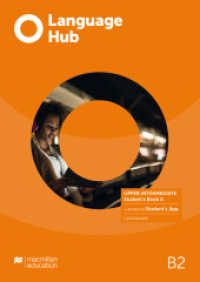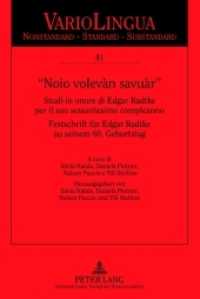- ホーム
- > 洋書
- > 英文書
- > Science / Mathematics
Full Description
This fully updated edition explores current techniques for research into antibiotic resistance. The book begins with how samples are collected, strains isolated and sequenced, and the results integrated in the microbiological workflow. It continues with novel methods to test resistance and interactions between antibiotics, physiological conditions, or using innovative tools like the hollow fiber or Raman spectroscopy, as well as mathematical models that can describe resistance within host. Written for the highly successful Methods in Molecular Biology series, chapters include introductions to their respective topics, lists of the necessary materials and reagents, step-by-step and readily reproducible laboratory protocols, and tips on troubleshooting and avoiding known pitfalls.
Authoritative and up-to-date, Antibiotic Resistance Protocols, Fourth Edition serves as an ideal guide for answering questions on how to control antibiotic resistance, to develop new agents, and to address the problems posed by microbes that have become resistant to our antibiotics.
Contents
Using the Zebrafish Larval Model of Infection to Investigate Antibiotic Efficacy and Combination Treatments Against Staphylococcus aureus.- Three-Dimensional Rotary Culture to Model Mycobacterial Biofilms in Low-Shear Detergent-Free Liquid Suspension.- Rapid Gene Silencing Followed by Antimicrobial Susceptibility Testing for Target Validation in Antibiotic Discovery.- Modified HT-SPOTi: An Antimicrobial Susceptibility Testing to Evaluate Formulated Therapeutic Combinations Against Bacterial Growth and Viability.- Investigating Combination Therapy as a Means to Enhance Activity and Repurpose Antimicrobials.- Investigating Photoactive Antimicrobials as Alternatives (or Adjuncts) to Traditional Therapy.- Using Hollow Fiber to Model Treatment of Antimicrobial Resistant Organisms.- A Microtitre Plate Assay at Acidic pH to Identify Potentiators that Enhance Pyrazinamide Activity Against Mycobacterium tuberculosis.- Within-Host Mathematical Models of Antibiotic Resistance.- Use of Individual-Based Mathematical Modelling to Understand More About Antibiotic Resistance Within-Host.- Monitoring Live Mycobacteria in Real-Time Using a Microfluidic Acoustic-Raman Platform.- Phylogenetic Survival Analysis.- Rapid Drug Susceptibility Testing to Preserve Antibiotics.- Quantifying Viable M. tuberculosis Safely Obviating the Need for High Containment Facilities.- Improved Diagnosis and Treatment Monitoring Tuberculosis Using Stool and the Tuberculosis Bacterial Load Assay (TB-MBLA).- Application of Pathogen Genomics to Outbreak Investigation.- Use of Whole Genome Sequencing for Mycobacterium tuberculosis Complex Antimicrobial Susceptibility Testing.- Use of Whole Genome Sequencing for Mycobacterium tuberculosis Complex Antimicrobial Susceptibility Testing: From Sequence Data to Resistance Profiles.- Analysis of Whole Genome Sequencing Data for Detection of Antimicrobial Resistance Determinants.






